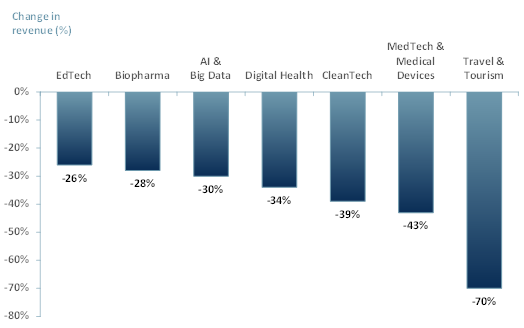Part I – What part will new tech play in economic recovery?
R-Zero Systems, a San Jose based company incorporated in April 2020, has developed UV-C (ultraviolet-C) portable units that can disinfect a room in minutes.
Co-founders Ben Boyer and Eli Harris’s vision is to expand the use of UV lights as a disinfectant tool from hospitals to all other businesses including hotels, restaurants and schools.
However, to decrease the amount of acquired infections, UV-C lights and frequent handwashing and sanitising must be used in tandem.
As a result, R-Zero Systems has designed, developed and manufactured two main products:
Touchless hand sanitizer dispenser – includes a thermal sensor, which can detect if a user has a fever and it can signal through a connectivity system to building managers when it needs a refill.
Mobile UV-C unit – each device is able to disinfect 1,000 square feet in approximately seven minutes.
R-Zero Systems will also provide protocols to its clients on how the products can be used in order to comply with respective local regulations and how they can cater to individual needs.
The UV-C device does not require FDA approval, so the products will be tested independently for efficacy, starting in August.
The co-founders are very optimistic that they will obtain several ongoing deals given the value of their product and its relevance to consumer needs in the new normal post-covid.
As a result of Covid-19 we have observed an increase in start-up companies in the technology sector, notably related to the healthcare sector in one way or another. Exhibit 1 showcases the top five start-ups, according to Forbes magazine, that are helping companies and consumers get through the pandemic.
Exhibit 1 – Top five start-ups post-covid, 2020

Sources: ACF Equity Research; Forbes
Companies such as R-Zero Systems might offer a safe and secure way of returning to pre-covid activities, such as returning to offices and attending schools. Also, it could promote a strong rebound for the hospitality sector as customers will feel more comfortable to go to bars and restaurants if they know there is an easily attainable high-level of hygiene.
R-Zero Systems affordable approach and competitive style could potentially put them under the investor spotlight. Moreover, these types of start-ups have the capability to enter into the category of “Unicorn” companies (i.e. companies that have a value of USD 1 billion+).
At the beginning of 2020, China had the most Unicorn companies in numbers, but US Unicorns had the highest total valuation.
According to the 2019 Global Start-up Ecosystem Report (GSER), the global start-up economy was worth nearly $3trn, 20% higher than in 2017. The top five start-up ecosystems are – Silicon Valley, New York City, London, Beijing and Boston.
Despite start-ups being an attractive investment opportunity, they have not been immune to Covid-19, with many industries experiencing a loss in revenues as shown in Exhibit 2. On the other hand, their resilience during the pandemic is largely due to the inclusion of advanced technology within their business operations.
Exhibit 2 – Change in revenues since the start of the Covid-19 pandemic, 2020

Sources: ACF Equity Research; Startup Genome
There are endless opportunities for small- and mid-cap companies to outperform in both local and global markets. The economy has benefited since the start of 2020 from the digital and technology innovations that have transformed tech products into a fundamental tool for economic recovery.
Furthermore, small and mid-cap companies are the largest generators of jobs.
However, even ‘genius’ ideas need policy support from government to stand a chance against the abundancy of competitors in global markets and the shockwaves triggered by the pandemic.
The start-up market has taken a down-turn as a result of covid, however, as we have seen, their products are essential in keeping morale high and businesses operating as ‘normal’. All the more reason why funding for start-ups and in particular healthcare start-ups both need to and will increase.
















